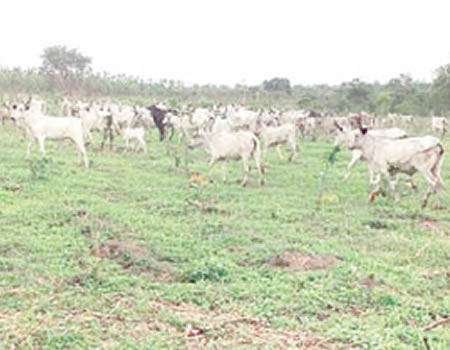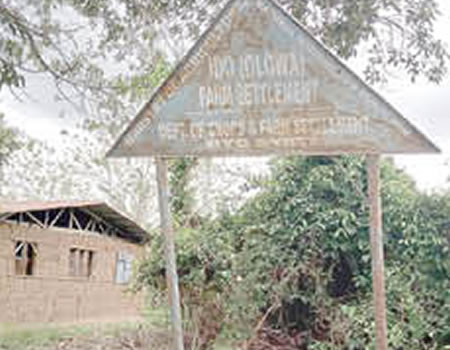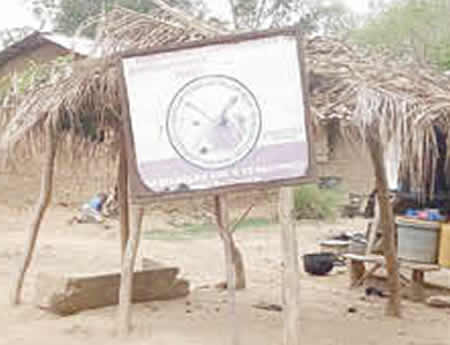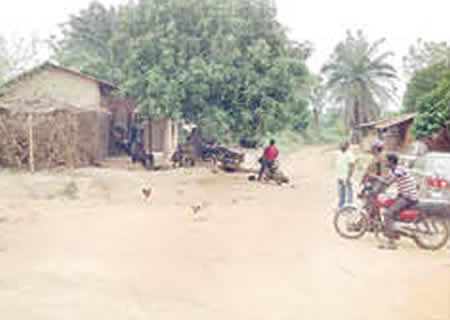Deputy Editor, SAM NWAOKO, reports that after complaints of sustained destruction of their crops and economy, farm holders and settlers at the Ido (Olowa) Farm Settlement in Ido Local Government Area of Oyo State decided to take the bull by the horns by personally chasing both the cows and their herders from their farms, and their sundry worries.
The farmers had personally taken charge of the dislodgement of herds of cattle which had been having a field day in their farms. The farmers under the aegis of Ido (Olowa) Farm Settlers Association contended that the roaming cows seen from afar as they grazed unrestrained were a regular sight and recurring problem in their farms at the Olowa Farm Settlement over the years. The day’s herders, the number of whom could not be identified, had disappeared into the vast brush and the hope to catch up with them had become futile.
Signs that the people of the area were fed up with the nuisance of the cattle was first seen at Idi-Iya village. It was their market day in the community and some of the traders at the Idi-Iya Market could not hide their delight as vehicles moved past them towards Olowa Farm Settlement. They were praying for a successful outing for the farmers and the security team.
The chasing party, comprising men of the Nigeria Police and a combined team of hunters and vigilante groups under a joint association, had combed the bush without success. “Anyone trying to catch up with Fulani herdsman in a bush race must be really good at it like the Fulani, and must be ready.” That was the gripping summary by one of the farm hands as the search waned and was obviously at its denouement.
The arrival of Saturday Tribune at the farms had coincided with the chasing of the herders and their cows. The unsightly chaos was better viewed from afar as the dozens of cows surprisingly ran in one direction, trampling crops, quashing ridges, destroying fences and raising dust. In the melee, their herders had scurried away, leaving the cows directionless and mooing in a cacophony according to their respective sizes.
The search party had combed hamlets namely Agbedegun, Gorojo, Aba Paanu Adejare and Alaga for the herders without success. Members of the team regrouped later to continue their push from Adejare while the farmers, who were returning from their farms, were converging at the village to rest. However, one common thing noticed among the members of the settlement was their distrust in the system, which has created a groundswell of fear of the unknown for telling their stories.
Amidst the consternation, Mr. Isiaka Ahmed Olanrewaju shrugged as he agreed to speak with Saturday Tribune and also tell his name. He said that they had suffered various kinds of losses year in year out, saying “until one tells of one’s pain, no one will know about it.” He said “the herders are doing their business. The farmers are also doing their own business. Each person is sourcing for his or her daily livelihood. The sour thing is a situation where a farmer would have planted his cassava, yam, corns or other crops and when it is time to harvest, cows would have eaten everything.”
Olanrewaju, who spoke in the midst of other agreeing farmers at the Adejare convergence, lamented thus: “Another scenario is when you have harvested your crops and stored them. Maybe, while bidding time or, say you are waiting for a vehicle to come to convey your harvest form the farms, Fulanis would lead their cows to where you have stored your produce and feed their cows with whatever they find there. They eat your yams, cassava, corns and so on. In some cases, they would harvest the yams or cassava or corns themselves and feed their animals. They also set farms on fire. That is painful and sometimes, confusing because we, more often than not end up losing everything. We have been pleading that government should step into this matter and help us and do something about it.”
Farmers recount Experiences
A farmer, who identified himself simply as Alfa, in adding to the scenario, said “my farm is very clean now and this shouldn’t be so because I have not harvested there. Only days ago, cows ate up my cassava and yams. They even uprooted my cassava and fed it to their cows. I’ve been thinking of how to go about it and I’m still confused.”
The community dwellers also told of some land holders who had either abandoned their farms or are just living with the menace. Recently, one of the farmers was said to have harvested his maize but could not convey all the produce from the farm at the same time. “He had stored the maze with their husk in large woven bags and planned to return for the maize. By the time he came, the bags had been stolen. He smelt foul play but thankfully, we could trace the feet of those whom we thought stole the bags.
“We traced the footsteps to where we found the bags. At the scene were tell tale signs that it was herders that took the bags, because there were cow hoof marks, dung and other things to show this. The bag was slashed open on its side and we could see that the cows fed on the corn. The matter is currently with the police.”
They also told of the case of a farm holder, whom the settlement dwellers said had “run away from the farm settlement.” According to them, the farmer got a piece of land and planted yams, tended the yams and there was no problem until he harvested the yams. After the harvest, he gathered the yams and covered them, awaiting evacuation. “On the day of evacuation, we discovered that the yams had been slashed as you do when you feed animals. Cow dung and the hoofs could be seen all around. The painful aspect of the whole thing is that after feeding their cows with the yams, they covered the yams as they were and set the barn on fire. Thus, they didn’t just destroy the yams, they also destroyed the seed yam we could have replanted.”
They also told of the experiences of women holder farmers who lost their farms, just as they narrated the yearly episode of burning of farms “so that they can have fresh grass to feed their cows.”
The Farm Settlers Association explained that they “have been in a running battle with herdsmen grazing on our farms at Olowa over time with cases at the Iyaganku Magistrate’s courts 1 and 6.” To give verve to their request for police support to dislodge the herders from their farms, they wrote a letter to the Divisional Police Officer in Ido requesting for the assistance of the police.
In the letter dated March 9, 2020 and received on the same day by the Police Division, the farmers said “we have suffered numerous abuse and intimidation, but in the pursuit of peace, we have restrained ourselves from taking laws into our hands even after having sensitised the herders to the fact that the settlement is a no grazing site by the Oyo State government.”
To them, the problem has been on for a long time, but it has heightened in recent years. Following its escalation, they said they had tried to let the security agencies do something and had written letters to the government and some of their representatives in government. However, according to Olanrewaju, these measures have not stopped them. “They come mostly in the late hours of the night or in the early hours of the morning, when we would have been tired and asleep. We would hear their cows mooing as they move and in the morning, we see their footprints and dung.
“Secondly, they move in numbers and they could be armed, so we are scared of coming out to confront them because we don’t want to be harmed. We don’t have them living around and right from the time this place was established as a government reserve area and people got allocations to farm, there were no Fulani here. They just came from nowhere and suddenly became a problem in our hands.
“As far as I know, there is no Fulani living on the farm. One of the roads passing through the farm leads to Oyo and they are always on the move, so I believe they are nomadic. Wherever they find themselves, they settle briefly and when they are done dealing with farms there, they move. We don’t have them living on the farm with us. We had taken steps in this regard by meeting with them. They would tell you that they have heard you and still do the same thing the farmers complained about. Recently, there was a meeting with the DPO at Ido. At the meetings were Baales, farmers and the Fulani to find solution to the problem. Still, it ended up just like the other sittings because they continued to destroy farms and produce.
“So all we want is the government to take steps to stop the herders from destroying our crops and harvests. The only saving grace we have is the fact that operatives of the VGN have been helping in curbing them and keeping them at bay. Without the VGN, we all might have abandoned the farms and relocated to the city. We therefore beg the government to help us find a lasting solution to the problem of Fulani herdsmen in the farm settlement. We want some form of security presence in the farm settlement. Otherwise, the government can strengthen the VGN already existing in the communities to work in collaboration with the police.
At Bateke hamlet, where the Ido (Olowa) Farm Settlement, said to be the second largest in Oyo State began, it was also the same tale of “we are tired of the destruction of our farms by cattle.” One settler, who said he had been in the community since 1999, said since he moved there as a trader before becoming a farmer, the problem of the destruction of crops by cattle had always been with the people. “I recall that the preponderance of the people had wanted one Fulani settler to leave their midst, because his cattle would always destroy crops. But instead, more of his kinsmen moved into Bateke to join him. When they move to graze their cattle, there could be as much as 100 cows in the herd. And even then, they were not as destructive as they have become now.”
He painted a scenario in telling what he thinks the solution should be: “We listen to the radio we hear the news. We have learnt of states where their governments have made laws to prevent open grazing. And when the government wants such law to be effective, it will surely be effective. When the government puts its foot on the ground and insists that there will not be open grazing, they will devise means of enforcing the law.”
Cry over govt neglect
Apart from the problem of the herders and their cattle, the people have one other major issue that agitates their mind: The bad roads in the settlement. The road from Ido town centre to Bateke and into the Olowa Farm Settlement community itself is one that would give any land holder, farmer or visitor great concern because of its condition. Gorojo, Agbedegun, Alaga are some of the hamlets found in Olowa village in Ido LGA of Oyo State and accessing the villages requires huge determination.
“If our roads are this bad in the dry season, it is better imagined what we go through in the rainy season; and soon the rains will start,” the farmers contended and said it would gladden their hearts if something was done about the roads before the rains descend.
Some of the settlers hold the opinion that the “Oyo State government doesn’t seem to know what the Farm Settlement looks like,” claiming that “the situation however doesn’t affect electoral campaigns when the time comes.”
Olanrewaju said “Yes, we do not have electricity because we are in a farm settlement and we do not have water because we are far from the city centre. But we should at least have the kind of roads that will make evacuation of farm produce easy. That would help us, help the economy of Oyo State and also make food and raw materials available for those who need them.”
They said they had written letters to government for the grading of the roads, with one of them volunteering that “we have 12 polling units in this area and we vote.”
Police reacts
The Public relations Officer of the Oyo State Police Command, Mr Olugbenga Fadeyi, told Saturday Tribune that there were reports of the cattle destroying farms from nearly all the areas in the state, saying “we have been having series of stakeholders meetings inviting all their leaders. This is throughout the state: Ido, Idi Ayunre, Saki, Ogbomoso, Ibadan, and Oyo… We have been having series of stakeholders meetings with government representatives and other relevant stakeholders, including Baales, Seriki of the Hausa communities, farmers and others at the police headquarters in Ibadan. We always dialogue to seek ways of making sure that all these things don’t happen again.
“We always charge them to go bad and talk to their people, sensitise them on the need to work together and work harmoniously and stop taking their cows to people’s farms and destroy crops. But sometimes, we still see these things happening occasionally and it is worrisome. The Commissioner of Police, Mr. Shina Olukolu has also always been telling them to replicate the meetings and sensitisation at their Area Commands and at the Divisional level. They have been doing this, but you will still see one or two recalcitrant ones.”
Fadeyi said the recalcitrance of some of the herders will not deter the police in the state as they will continue to pursue the path of peaceful coexistence. “We will continue to collaborate, sensitise, advice and tell them to maintain peace because if we don’t do this, the matter might degenerate and people might be attacking themselves.
“So, I will still advice the farmers at Ido Olowa Farm Settlement to still remain peaceful, work with the DPO at Ido to ensure there is peace.”









